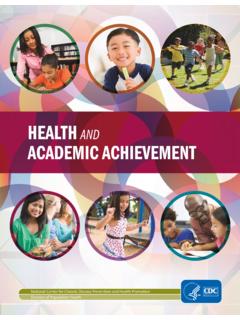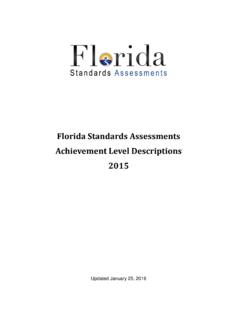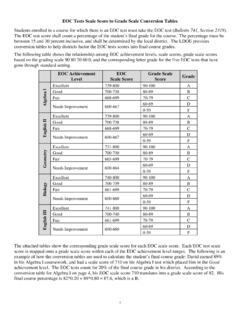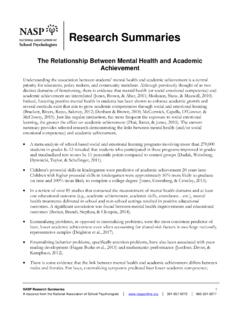Transcription of Reviewing the evidence on how teacher professional ...
1 ISSUES& Department of EducationReviewing the evidence on how teacher professional development affects student achievementREL 2007 No. 033At Edvance Research, the evidence on how teacher professional development affects student achievementOctober 2007 Prepared byKwang Suk Yoon American Institutes for ResearchTeresa Duncan American Institutes for ResearchSilvia Wen-Yu Lee American Institutes for ResearchBeth Scarloss American Institutes for ResearchKathy L. Shapley Edvance ResearchISSUES&ANSWERSREL 2007 No. Department of EducationAt Edvance Research, & Answers is an ongoing series of reports from short-term Fast Response Projects conducted by the regional educa-tional laboratories on current education issues of importance at local, state, and regional levels.
2 Fast Response Project topics change to reflect new issues, as identified through lab outreach and requests for assistance from policymakers and educa-tors at state and local levels and from communities, businesses, parents, families, and youth. All Issues & Answers reports meet Institute of Education Sciences standards for scientifically valid research. October 2007 This report was prepared for the Institute of Education Sciences (IES) under Contract ED-06-CO-0017 by Regional Educa-tional Laboratory Southwest administered by Edvance Research. The content of the publication does not necessarily reflect the views or policies of IES or the Department of Education nor does mention of trade names, commercial products, or organizations imply endorsement by the report is in the public domain.
3 While permission to reprint this publication is not necessary, it should be cited as: Yoon, K. S., Duncan, T., Lee, S. , Scarloss, B., & Shapley, K. (2007). Reviewing the evidence on how teacher professional development affects student achievement (Issues & Answers Report, REL 2007 No. 033). Washington, DC: Department of Education, Institute of Education Sciences, National Center for Education Evaluation and Regional Assistance, Regional Educational Laboratory Southwest. Retrieved from report is available on the regional educational laboratory web site at AWVKYTNP ANYFLAKMNWIIAILINMIOHVTNHMEMOAt Edvance Research, Inc. iiiSummaryOf the more than 1,300 studies identi-fied as potentially addressing the effect of teacher professional development on student achievement in three key con-tent areas, nine meet What Works Clear-inghouse evidence standards, attesting to the paucity of rigorous studies that directly examine this link.
4 This report finds that teachers who receive sub-stantial professional development an average of 49 hours in the nine studies can boost their students achievement by about 21 percentile does teacher professional development affect student achievement ? The connection seems intuitive. But demonstrating it is difficult. Examining more than 1,300 studies identified as potentially addressing the effect of teacher professional development on student achieve-ment in three key content areas, this report finds nine that meet What Works Clearing-house evidence standards. That only nine meet standards attests to the paucity of rigorous studies that directly assess the effect of in-service teacher professional development on student achievement in mathematics, science, and reading and English/language the results of those studies that average control group students would have increased their achievement by 21 percentile points if their teacher had received substantial profes-sional development indicates that provid-ing professional development to teachers had a moderate effect on student achievement across the nine studies.
5 The effect size was fairly consistent across the three content areas reviewed. All nine studies focused on elementary school teachers and their students. About half fo-cused on lower elementary grades (kindergar-ten and first grade), and about half on upper elementary grades (fourth and fifth grades).Six studies were published in peer-reviewed journals; three were unpublished doctoral dissertations. The studies were not particularly recent, ranging from 1986 to studies were randomized controlled trials that meet evidence standards without reserva-tions. Four studies meet evidence standards with reservations (one randomized controlled trial with group equivalence problems and three quasi-experimental designs).
6 Four focused on student achievement in read-ing and English/language arts unsurprising given the large literature in this content area. Two studies focused on mathemat-ics, two on mathematics and reading and Reviewing the evidence on how teacher professional development affects student achievementiv SummaryEnglish/language arts, one on science, and one on mathematics, science, and reading and English/language one effect of the 20 identified across the nine studies was negative, and only one effect was zero. The other 18 were positive. The sole negative effect was in a study of mathemat-ics (fractions computation), where traditional instruction showed more positive effects on student achievement than a reform model.
7 The effect was not statistically significant but was large enough to be considered substantively important. The sole zero effect was in a study of reading and English/language arts, where low-achieving students whose teachers were trained to use explicit instructional talk did not demonstrate appreciably greater reading achievement than their counterparts whose teachers attended a presentation on effective classroom that had more than 14 hours of pro-fessional development showed a positive and significant effect on student achievement from professional development. The three stud-ies that involved the least amount of profes-sional development (5 14 hours total) showed no statistically significant effects on student nine studies employed workshops or sum-mer institutes.
8 In all but one study follow-up sessions supported the main professional development event. The exception provided an intensive four-week summer workshop without follow-up support. In all nine stud-ies professional development went directly to teachers rather than through a train-the-trainer approach and was delivered by the authors or their affiliated of the lack of variability in form and the great variability in duration and intensity across the nine studies, discerning any pat-tern in these characteristics and their effects on student achievement is difficult. A larger number of rigorous studies on the link be-tween professional development and student achievement might have made it possible to determine whether intensive, sustained, and content-focused professional development is more the problems of many studies of professional development, this report can help researchers avoid methodological pitfalls.
9 Especially important is that researchers under-taking studies with quasi-experimental designs provide data on the baseline equivalence of the treatment and comparison groups. Future studies of the effect of professional develop-ment on both teachers and students would be particularly useful studies more fully address-ing professional development s direct effect on teachers and its indirect effect on 2007 vTable of conTenTsOverview 1 Demonstrating the effect of teacher professional development on student achievement 3 The links among professional development, teacher learning and practice, and student achievement 3 The quality of empirical evidence 4 Nine studies that meet evidence standards 6 Effects of professional development on student achievement in the nine studies 6 Effects by content area 8 Effects by form.
10 Contact hours, intensity, and duration of professional development 12 Effects by models and theories of action of professional development 12 Better evaluation for better professional development 14 Notes 18 Appendix A Methodology 19 Appendix B Protocol for the review of research-based evidence on the effects of professional development on student achievement 29 Appendix C Key terms and definitions related to professional development 36 Appendix D List of keywords used in electronic searches 38 Appendix E Relevant studies, listed by coding results 45 References 53 Boxes1 A study of professional development in mathematics 22 Methodology 73 Kennedy s professional development content groups 12 Figures1 How professional development affects student achievement 4A1 Overview of the coding process 21 Table s1 Effects of professional development on student achievement , by study 92 Effects of professional development on student achievement , by content area 103 Features of professional development in the nine studies that meet evidence standards 15A1 Number of potentially relevant studies.


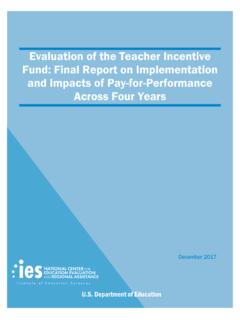







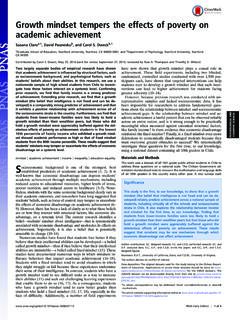
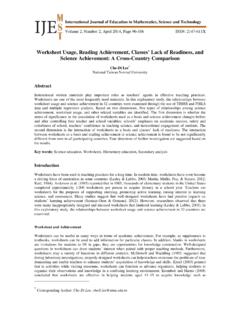
![[STUDENT ACHIEVEMENT FACTORS] - ed](/cache/preview/5/b/7/7/7/3/a/d/thumb-5b7773ad29f4cb9f9299867670f10529.jpg)
